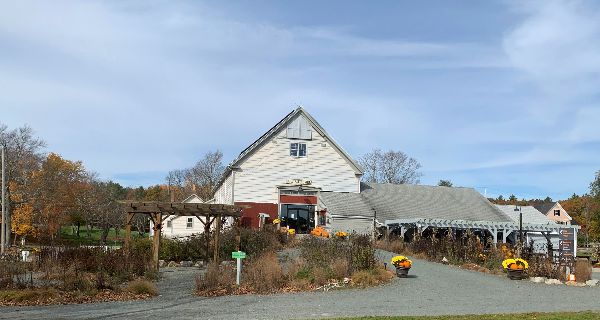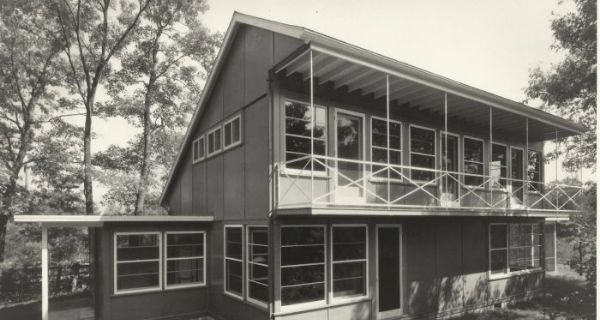By Elisha Lee
Hometown Weekly Contributor
One of the most visible reminders of Dover’s rich agricultural heritage is Powisset Farm. Situated on Powisset Street, the land is said to have been used by Dedham residents to pasture cattle as early as the 1660s, and has been farmed continuously for more than three centuries.
Onetime local historian Frank Smith (1914) tells us that Powisset Farm was first settled by Samuel Chickering (1689-1778), presumably at some point shortly after his marriage to Mary Harding in 1720. Smith adds that the Chickering homestead was situated “near Rattlesnake Rock”, which may be the area known today as Powisset Peak, although it is more likely that the Chickering home was located in the vicinity of what is now 42 Powisset Street. With the marriage of Samuel and Mary Chickering’s only surviving child, Mary, to Samuel Fisher in 1751, ownership passed into the Fisher family.
Samuel and Mary’s son, Samuel Fisher (1757-1822), was one of the town’s largest landowners. Smith notes that by 1821, Powisset Farm encompassed almost 500 acres. A Revolutionary War veteran, Fisher served as a corporal in Robert Smith’s company of Needham militia and marched to Lexington and Concord on April 19, 1775. He later served in Rhode Island as a captain in Colonel Ebenezer Howe’s regiment and retained the title throughout the remainder of his life. Samuel married Abigail Mason of Medfield in 1782 and had nine children, of whom six survived to maturity. He built a sawmill on Noanet Brook and, with timber cut from trees lost in the Great September Gale of 1815, constructed the farmhouse which formerly stood on the site of 40 Powisset Street. With the marriage of his daughter Abigail to Timothy Allen, Jr. in 1807, Captain Samuel and Mary Fisher relocated to the center of town.
Born on Pegan Hill, Timothy Allen, Jr. (1782-1869) was one of the original investors in the short-lived Dover Union Iron Works on Noanet Brook. A farmer for much of his life, the 1850 Federal Agricultural Census indicates that he had 95 acres of improved land and another 55 acres unimproved, with a cash value of $2,500. The values given for nearby farms range from $1,000 to $6,000, which suggests that Allen’s farm was a relatively modest operation. The census further tells us that he owned one horse, two milch cows, two working oxen, and four swine. Crops included 80 bushels of Indian corn, 30 bushels of oats, 100 bushels of Irish potatoes, and 250 lbs. of butter.
On Timothy Allen’s death in 1869, his heirs sold the property to Bernhard and Barbara Post of Needham. Bavarian immigrants, the Post family operated Powisset Farm as a wholesale milk business and it is likely that the present barn was constructed during this period, as was the farmhouse at 42 Powisset Street. In 1913, John H. and George E. Post sold the farm to Horatio Hathaway, Jr. of Dedham. The Boston Globe reported at the time of the sale that the farm encompassed 140 acres “with a large barn and two commodious dwellings.”
Horatio Hathaway, Jr. (1870-1934), scion of a wealthy New Bedford family, resided in Dedham and probably never lived on Powisset Farm. A noted sportsman, yachtsman, and equestrian, Hathaway appears to have raised horses on the property, as a large stock stable burned on 17 November, 1924, requiring the services of both the Dover and Dedham Fire Departments.
In 1925, Hathaway sold the property to Richard Sheehan of Marlow, County Cork, Ireland. Sheehan continued the use of the property as a horse farm, traveling annually back to Ireland to purchase stock, which he then re-sold to wealthy Boston equestrians. In 1930, Sheehan sold Powisset Farm to Amelia Peabody. At that time, the farm encompassed 141.84 acres. Miss Peabody was already the owner of Mill Farm, which abutted the property on its northern side. A biographical pamphlet published by the Peabody Foundation states that she purchased the farm to prevent its acquisition by a local flying club for use as a landing field. During the 1930s, she appears to have leased at least a portion of the farm to a horse trainer by the name of Danny Shea, who operated Danny Shea Stables at Powisset Farm. Miss Peabody also raised prize winning Hereford cattle and Yorkshire pigs; the latter housed in a centrally heated pigsty designed by architect Eleanor Raymond. Always interested in progressive architecture, Miss Peabody also used Eleanor Raymond to design a series of houses for her employees using non-traditional building materials such as plywood, cinderblock, and Masonite. In partnership with Raymond and Maria Telkes of M.I.T., she built one of the country’s first solar-powered homes at 49 Powisset Street. Of these, only the Masonite House at 53 Powisset Street has survived.
With Amelia Peabody’s death in 1984, Powisset Farm passed into the ownership of the Trustees of Reservations. Dover is fortunate that the property remains in agricultural use, now supporting an active CSA program, farm stand, and teaching kitchen, as well as a summer camp and after-school program.


























